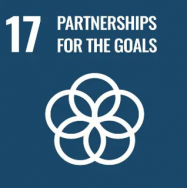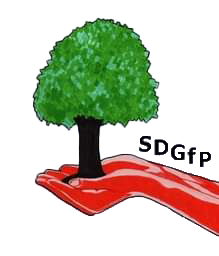Sustainable Development Goal 17. Partnership for the Goals

Sustainable Development Goal 17 (SDG 17) is about "partnerships for the goals."
One of the 17 Sustainable Development Goals established by the United Nations in 2015, the official wording is: "Strengthen the means of implementation and revitalize the global partnership for sustainable development". The SDGs can only be realized with strong global partnerships and cooperation.
The Goal has 17 targets to be achieved by 2030, broken down into five categories: finance, technology, capacity building, trade and systemic issues. Progress towards targets is measured by 25 indicators.
17.1: Mobilize resources to improve domestic revenue collection
17.2: Implement all development assistance commitments
17.3: Mobilize financial resources for developing countries
17.4: Assist developing countries in attaining debt sustainability
17.5: Invest in least-developed countries
17.6: Knowledge sharing and cooperation for access to science, technology and innovation
17.7: Promote sustainable technologies to developing countries
17.8: Strengthen the science, technology and innovation capacity for least-developed countries
17.9: Enhanced SDG capacity in developing countries
17.10: Promote a universal trading system under the WTO
17.11: Increase the exports of developing countries
17.12: Remove trade barriers for least-developed countries
17.13: Enhance global macroeconomic stability
17.14: Enhance policy coherence for sustainable development
17.15: Respect national leadership to implement policies for the sustainable development goals
17.16: Enhance the global partnership for sustainable development
17.17: Encourage effective partnerships
17.18: Enhance availability of reliable data
17.19: Further develop measurements of progress
A successful sustainable development agenda requires partnerships between governments, the private sector and civil society. These 17 ambitious goals and the complex challenges they seek to address fit neither neatly demarcated sectors, nor national borders. Climate change is global, and businesses are just as important to fighting it as governments. Innovation can’t happen without universities and scientists, and certainly not without exchange of knowledge across continents. Gender equality is as much about communities as it is about legal instruments. If our epidemics are global, their solutions are too. Inclusive partnerships built upon a shared vision and shared goals that place people and the planet at the centre, are needed at the global, regional, national and local level.
SDG 17 refers to the need for cross sector and cross country collaboration in pursuit of all the goals by the year 2030. It is a call for countries to align policies. SDG 17 is a vision for improved and more equitable trade, as well as coordinated investment initiatives to promote sustainable development across borders. It is about strengthening and streamlining cooperation between nation-states, both developed and developing, using the SDGs as a shared framework and a shared vision for defining that collaborative way forward. It seeks to promote international trade, and help developing countries increase their exports to ensure a universal rules-based and equitable trading system that is fair, open and beneficial to all.
This is the challenge that brings our efforts on all the other 16 goals together. An ambitious and interconnected global development agenda requires a new global partnership – this includes financing development, connecting people through information technology networks, international trade flows, and strengthening data collection and analysis. Even as the world comes together to unite for global development – in 2018, official development assistance stood at USD 153 billion, a small decrease of 0.6% from 2016 in real terms – only five countries met the UN target of providing official development assistance to the tune of 0.7% of their gross national income in 2018. People around the world come closer together through physical and digital networks – well over half of the world’s population (more than 4 billion user) is now online, with the latest data showing that nearly a quarter of a billion new users came online for the first time in 2017.
Many countries require Official Development Assistance to encourage growth and trade. Yet, aid levels are falling and donor countries have not lived up to their pledge to ramp up development finance.
Due to the COVID-19 pandemic, the global economy is projected to contract sharply, by 3 per cent, in 2020, experiencing its worst recession since the Great Depression.
The UN Secretary-General gave a development of strategy that spread out a dream for how the global network can show a powerful, organized reaction to the COVID-19 pandemic.
Urgent action is needed to mobilise, redirect and unlock the transformative power of trillions of dollars of private resources to deliver on sustainable development objectives. Long-term investments, including foreign direct investment, are needed in critical sectors, especially in developing countries. These include sustainable energy, infrastructure and transport, as well as information and communications technologies. The public sector will need to set a clear direction. Review and monitoring frameworks, regulations and incentive structures that enable such investments must be retooled to attract investments and reinforce sustainable development. National oversight mechanisms such as supreme audit institutions and oversight functions by legislatures should be strengthened.
Links to other SDGs
The success of the 2030 agenda requires inclusive partnerships to achieve the common goals adopted. These partnerships need to be set at the different constituencies (local, national, regional and global level) and consider the Sustainable Development Goals’principles, vision and values to place people and planet first now more than ever to recover from crisis and build back while achieving the SDGs.
More often than not, the actualization of the SDGs, at the global level, depends on the effectiveness of the official development assistance. The Official development assistance needs to leverage on international collaboration for the public financing of the developing countries that remained unfulfilled by the donors. It is the responsibility of the official development assistance to ensure that, most developing countries are supported in areas of water and sanitation related activities and programs rather than making use of their domestic resources, tariffs and public finance obtain through taxation.




